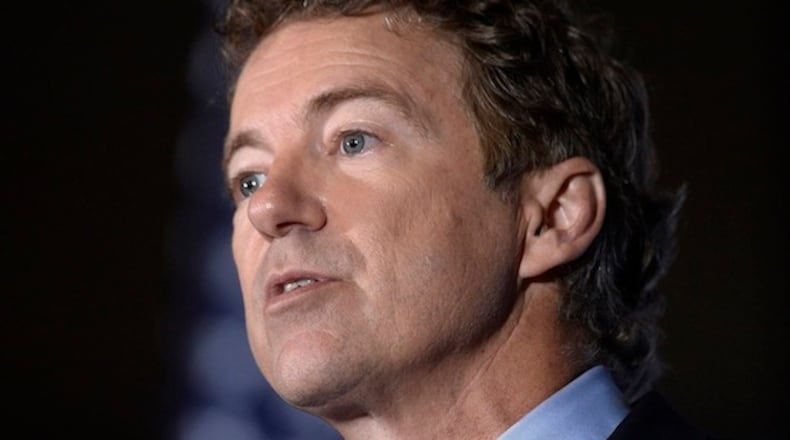Kentucky Republican Sen. Rand Paul is quickly positioning himself again as a starkly independent Republican, the sort of political branding that fueled his presidential campaign last year.
Paul has a clearly conservative voting record. But just six weeks into the new Congress, he's taken some high-profile steps away from party orthodoxy.
He didn't get very far in his bid for the Republican presidential nomination last year. But he stood out then, and is trying to stand out now, by breaking with the party on the same issues where he attracted a following, particularly among the GOP's libertarian wing.
"I think he was trying to signal to his core supporters that he hasn't lost sight of or given up on the fiscal issues that propelled his movement to begin with," said Scott Jennings, a Republican political consultant in Kentucky.
Paul cast the only Republican vote against his party's first attempt last month to repeal the Affordable Care Act. He was also the only Republican to vote against Mike Pompeo, President Donald Trump's nominee for CIA director.
He's met with members of the ultraconservative House Freedom Caucus _ perhaps best known for forcing a government shutdown and pushing former Speaker John Boehner, R-Ohio, to quit Congress _ to discuss health care changes. And he offered his own health care plan.
Paul would not comment to McClatchy, but spokesman Sergio Gor said the senator "has always been willing to work with individuals across the political spectrum who share the same goals."
Craig Holman, a lobbyist for Public Citizen, a nonpartisan government watchdog group, said Paul might be able to step in if Republicans turned on Trump or he became unelectable.
"I would fully expect Rand Paul to throw his hat in the ring," Holman said.
Paul continues to maintain his solid conservative credentials. The American Conservative Union gives him a lifetime legislative score of 97, the highest among Kentucky's delegation on Capitol Hill. Senate Majority Leader Mitch McConnell, R-Ky., has a lifetime score of 89.
Yet in a highly partisan, sometimes bitterly polarized Senate, Paul has proved willing to work with Democrats on issues where they agree, whether it's criminal justice, infrastructure, foreign policy or national security.
"I have heard people say that Rand is a well-liked member who has done a good job of cultivating relationships in both parties," Jennings said.
One of Paul's unlikely partnerships involved former California Sen. Barbara Boxer, a liberal Democrat. They pushed a bill in 2015 to change the tax code to raise money for infrastructure.
He's worked with other Democrats who are not ordinarily his ideological soul mates, and they embrace it. Sen. Chris Murphy of Connecticut said he'd introduced as many bills with Paul as he had with some of his Democratic colleagues.
Both co-sponsored a bill last year to block an Obama administration arms sale to Saudi Arabia over that country's airstrike campaign in Yemen, which has killed thousands of civilians.
"He's a real conservative firebrand who doesn't see relationships with Democrats as a sign of ideological weakness," Murphy said. "He's always been somebody who reaches out vigorously to Democrats, and that hasn't stopped since the election of Trump."
Paul and New Jersey Democratic Sen. Cory Booker have banded together in an effort to keep nonviolent offenders out of prison and ensure they're not deprived of civil liberties.
"He's willing to lean in and work together with us on it," Booker said. "I'm proud that he's a partner with me on that."
Paul has long been a staunch critic of the foreign policy that got the U.S. into a prolonged and costly war in Iraq, and he hasn't spared either of Trump's predecessors, Democrat Barack Obama and Republican George W. Bush. It's a position that endears him to Democrats.
"We are often of like mind when it comes to the hubris America has exhibited in the world," Murphy said.
That doesn't have to mean passing a bill, Murphy said. The Senate voted down their legislation to block the weapons sale to Saudi Arabia. However, they forced a debate on the Senate floor, and a few months later, the administration canceled the sale.
"I think the debate we pushed on the floor had something to do with that," Murphy said.
Democratic Sen. Ron Wyden of Oregon shares a passion with Paul for protecting the privacy rights of Americans. When Trump nominated Pompeo to lead the CIA, Wyden and Paul agreed that senators should know about Pompeo's proposal to expand a bulk data-collection program that alarmed civil liberties advocates.
Wyden, a member of the Senate Intelligence Committee, sharply questioned Pompeo about the issue in his confirmation hearing. Though the committee and later the full Senate ultimately confirmed Pompeo, Wyden and Paul voted no.
Wyden said he spoke frequently with Paul and their staffs communicated, as well.
"National security is what we talk most about," Wyden said. "But our wives like each other."
Jennings said that in an era when Washington was known for its partisanship, Paul's work with Democrats and breaking with Republicans and Trump might not be such a bad thing.
"You're carving out a unique policy position that may align you with unlikely allies," he said. "It probably strengthens your hand when you're arguing on the Senate floor."
Or when you're running for president.
"He wants to shape the Republican Party in his own image," Holman said.
About the Author
Keep Reading
The Latest
Featured



